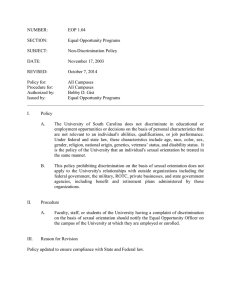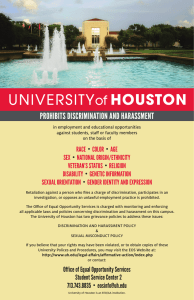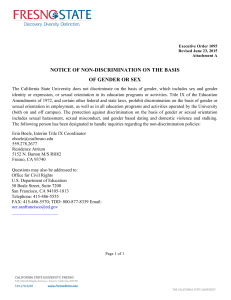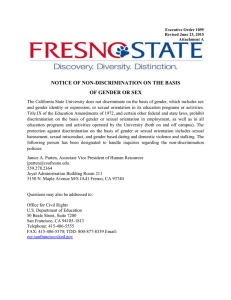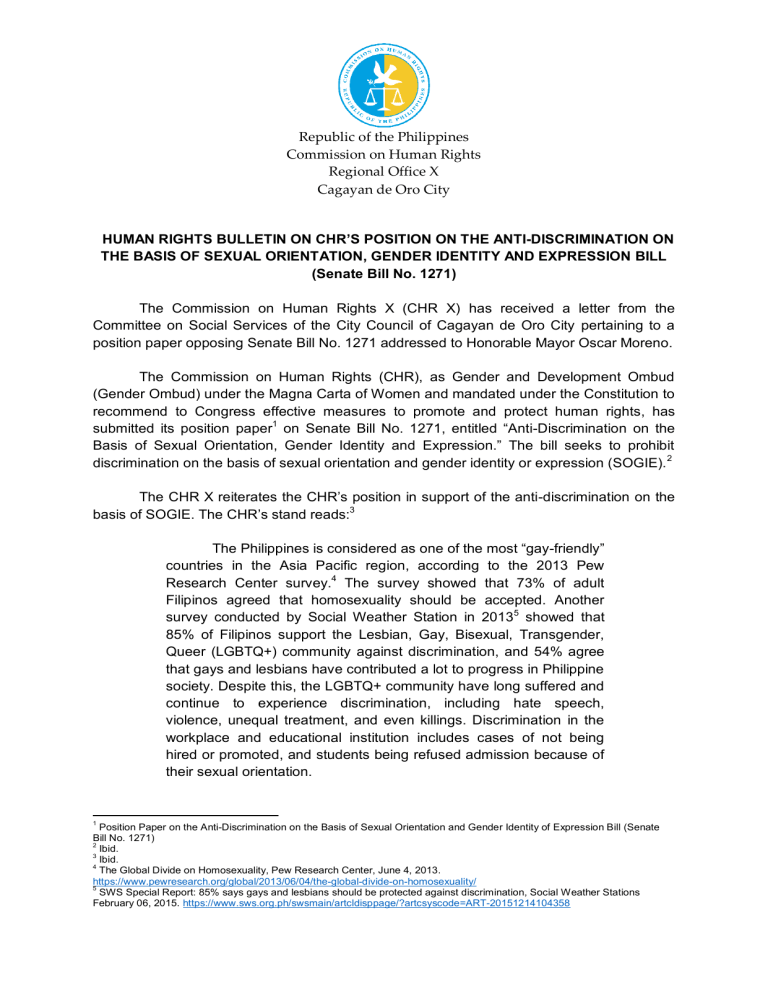
Republic of the Philippines Commission on Human Rights Regional Office X Cagayan de Oro City HUMAN RIGHTS BULLETIN ON CHR’S POSITION ON THE ANTI-DISCRIMINATION ON THE BASIS OF SEXUAL ORIENTATION, GENDER IDENTITY AND EXPRESSION BILL (Senate Bill No. 1271) The Commission on Human Rights X (CHR X) has received a letter from the Committee on Social Services of the City Council of Cagayan de Oro City pertaining to a position paper opposing Senate Bill No. 1271 addressed to Honorable Mayor Oscar Moreno. The Commission on Human Rights (CHR), as Gender and Development Ombud (Gender Ombud) under the Magna Carta of Women and mandated under the Constitution to recommend to Congress effective measures to promote and protect human rights, has submitted its position paper1 on Senate Bill No. 1271, entitled “Anti-Discrimination on the Basis of Sexual Orientation, Gender Identity and Expression.” The bill seeks to prohibit discrimination on the basis of sexual orientation and gender identity or expression (SOGIE). 2 The CHR X reiterates the CHR’s position in support of the anti-discrimination on the basis of SOGIE. The CHR’s stand reads:3 The Philippines is considered as one of the most “gay-friendly” countries in the Asia Pacific region, according to the 2013 Pew Research Center survey.4 The survey showed that 73% of adult Filipinos agreed that homosexuality should be accepted. Another survey conducted by Social Weather Station in 20135 showed that 85% of Filipinos support the Lesbian, Gay, Bisexual, Transgender, Queer (LGBTQ+) community against discrimination, and 54% agree that gays and lesbians have contributed a lot to progress in Philippine society. Despite this, the LGBTQ+ community have long suffered and continue to experience discrimination, including hate speech, violence, unequal treatment, and even killings. Discrimination in the workplace and educational institution includes cases of not being hired or promoted, and students being refused admission because of their sexual orientation. 1 Position Paper on the Anti-Discrimination on the Basis of Sexual Orientation and Gender Identity of Expression Bill (Senate Bill No. 1271) 2 Ibid. 3 Ibid. 4 The Global Divide on Homosexuality, Pew Research Center, June 4, 2013. https://www.pewresearch.org/global/2013/06/04/the-global-divide-on-homosexuality/ 5 SWS Special Report: 85% says gays and lesbians should be protected against discrimination, Social Weather Stations February 06, 2015. https://www.sws.org.ph/swsmain/artcldisppage/?artcsyscode=ART-20151214104358 The anti-discrimination bill on the basis of sexual orientation has languished in Congress since 1999.6 Local ordinances prohibiting discrimination based on SOGIE have been passed in local governments, such as Quezon City, Cebu, Davao, and Dinagat Islands, among others.7 These local ordinances significantly contributed to the growing acceptance of LGBTQ+ community in our society. Unfortunately, this is not enough to protect the individual rights of people with diverse SOGIE. People belonging to the LGBTQ+ community have been prejudiced and stigmatized for the reason that they do not conform to society’s norms where men should be masculine and women should be feminine. Discrimination in any form demeans the dignity and human rights of a person as it limits an individual’s freedom and self-realization. The Commission emphasizes that this proposed measure seeks to address the crucial issues of differential treatment of an employee or anyone engaged to render services, denial of admission or expulsion from educational institution, and other forms of discrimination on the basis of SOGIE. Further, it does not negate religious freedom, which is also a fundamental human right, nor does it create a special right for the LGBTQ+ community. The rights to equality and freedom from discrimination based on sex or other status are enshrined in the Universal Declaration of Human Rights (UDHR), 8 the International Covenant on Civil and Political Rights (ICCPR),9 and the International Covenant on Economic, Social, and Cultural Rights (ICESCR).10 The 1987 Philippine Constitution provides that the State values the dignity of every human person and guarantees full respect for human rights. The Philippines with a State policy to adopt generally accepted principles of international law as part of the law of the land and as State Party to the ICCPR and ICESCR, has the obligation to uphold the fundamental rights of equality and nondiscrimination by adopting positive measures in all areas to enable very person to enjoy these rights. The proposed measure is an example of a positive action of the State to advance equality and nondiscrimination of persons with diverse SOGIE. It is the responsibility of the State to protect the rights and uphold the dignity of all by providing an enabling environment free of discrimination and stigma for everyone to fully enjoy their human rights, and for the LGBTQ+ community to be able to freely express themselves and contribute to the betterment of the community. It is in this light that the Commission, as primary proponent of human rights in the Philippines, guided by the eight key human rights 6 An Act Prohibiting Discrimination on the Basis of Sexual Orientation, 11th Congress of the Philippines. Authored by Rep. Etta Rosales and Sen Miriam Santiago 7 https://www.rappler.com/move-ph/issues/gender-issues/100631-ph-anti-discrimination-law-history 8 Articles 1, 2, and 7, Universal Declaration of Human Rights. 9 Articles 2(1), 25, and 26, International Covenant on Civil and Political Rights. 10 Articles 2(2) and 3, International Covenant on Economic, Social, and Cultural Rights Page 2 of 7 instruments to which the Philippines is a State Party to and the Yogyakarta Principles, expresses its support for the passage of the bill. Human rights are inherent in all persons regardless of gender, race, culture, religion, and any other status and all human beings are born free and equal in dignity and rights.11 Section 5 (a) of SB 1271 lists discriminatory practices which includes promotion and encouragement of stigma on the basis of SOGIE in media, educational textbooks, and other medium, and inciting violence and sexual abuse against any person or group on the basis of SOGIE. This is consistent with General Recommendation no. 19 of the UN Committee on the Elimination of all forms of Discrimination Against Women, which regards gender-based violence as a hindrance on women from enjoying their rights 12 on the basis of gender equality. This is further reaffirmed in General Recommendation No. 28 calling on State Parties to adopt and pursue policies that will eliminate the occurrence of discrimination based on a woman’s sexual orientation or gender identity. 13 On the other hand, the UN Committee against Torture provides in General Comment No. 2 that States should provide protection for individuals or groups made vulnerable by discrimination,14 by taking into account that both men and women who do not conform to socially determined gender roles may be subject to torture or inhuman and degrading treatment. The Commission also emphasizes the importance of Section 5 (i) of the bill which prohibits the conduct of medical or psychological means to determine or alter a person’s SOGIE as it is also a form of discrimination and tantamount to mental torture. The UN High Commissioner for Human Rights15 condemned the use of “conversion therapy” as it violates the prohibition on torture and degrading treatment. Team Magazine, a local online LGBT-oriented magazine 16 published a story in 2011 of a young man forced to undergo conversion therapy by means of penile plethysmograph. This practice is also called “sexual orientation change efforts.” It has been used to try to alter an individual’s sexual orientation, but was proven unethical, unscientific, and ineffective. 11 Article 1, Universal Declaration of Human Rights UN Committee on the Elimination of all Forms of Discrimination against Women (CEDAW), CEDAW General Recommendation no. 19: Violence against Women, 1992, available at: https://www.refworld.org/docid/52d920c54.html. 13 General Recommendation No. 28 on the core obligations of States parties under article 2 of the Convention on the Elimination of All Forms of Discrimination against Women, CEDAW Committee, December 26, 2010. CEDAW/C/GC/28. 14 General Comment No. 2, Implementation of article 2 by States parties, Committee Against Torture, 24 January 2018. CAT/C/GC/2. 15 Discrimination and violence against individuals based on their sexual orientation and gender identity, Human Rights Council, 4 May 2015. A/HRC/29/23. 16 Breaking bading – An account of conversion therapy, TEAM Magazine, 06 November 2017, https://teammag.ph/breaking-badingaccount-conversion-therapy/ 12 Page 3 of 7 We equally support Section 5 (j), which prohibits profiling based on sexual orientation and gender identity, as it promotes stigma and prejudice among the LGBTQ+ community. It also prohibits individuals from being subjected to detention on the basis of SOGIE by members of law enforcement agencies, including immigration authorities. This provision gives cognizance to Principle No. 7 of the Yogyakarta Principles, which states that all persons regardless of sexual orientation or gender identity are entitled to due process whether or not charged with an offense. We take this opportunity to raise the issue of humane treatment while in detention where people with diverse SOGIE should not be subject to risk of violence or further marginalization. Further, Principle No. 9 strongly urges States to ensure that persons deprived of liberty are able to participate in decisions regarding the place of detention appropriate to their sexual orientation and gender identity. xxx In conclusion, the Commission supports measures to protect people with diverse SOGIE from discrimination, including those addressing issues of employment and associated rights. This measure will hopefully spark not just policy forum, but also increase the acceptance of persons with diverse SOGIE in society, creating a healthy environment conducive for all. The passage of the Antidiscrimination Bill based on SOGIE will be a major step towards fulfilling the State’s duty to respect, protect, and fulfill the human rights of all. The Senate Bill No. 1271 focused more on the acts of discrimination being faced by persons with diverse SOGIE. The bill defines ‘discrimination’ as: ‘refers to any distinction, exclusion, restriction, or preference based on the grounds of sex, sexual orientation, gender identity or expression, hereinafter referred to as “SOGIE”, and has the purpose or effect of nullifying or impairing the recognition, access to, enjoyment, or exercise by all persons on an equal footing of all rights and freedoms. For purposes of this provision, the actual sex, sexual orientation or gender identity of the person subjected to discrimination shall not be relevant for the purpose of determining whether an act of discrimination has been committed.17 The terms sexual orientation, gender identity and expression have a different meaning and should not be used interchangeably with sex. 17 Sec. 3(a). Page 4 of 7 Sexual orientation refers to each person’s capacity for profound emotional, affectional and sexual attraction to, and intimate and sexual relations with, another person.18 Gender identity is a person’s internal sense of being a man or a woman or a third or alternative gender, or a combination of genders.19 Gender expression is a person’s ways of communicating masculinity or femininity (or both or neither) externally. This is done through physical appearance – including clothing, hair styles and the use of cosmetics – and mannerisms, ways of speaking and behavioral patterns when interacting with others.20 Sex, on the other hand is differentiated from the term SOGIE, which refers to ‘a person’s biological characteristics. These may be genetic, hormonal or anatomical and typically are used to categorise people into two distinct categories as either male or female.’21 The oppositors claim that the bill is anti-family and anti-marriage citing Family Code, which defines marriage as: a special contract of permanent union between a man and a woman entered into in accordance with law for the establishment of conjugal and family life. It is the foundation of the family and an inviolable social institution whose nature, consequences, and incidents are governed by law and not subject to stipulation, except that marriage settlements may fix the property relations during the marriage within the limits provided by this Code.22 The bill sought to prohibit discrimination in employment and associated rights on the basis of one’s sexual orientation, gender identity or expression. Senate Bill No. 1271, does not attempt to legislate same-sex marriages (usually called Marriage Equality in other jurisdictions). Contrary to the claim of the oppositors, the bill likewise does not encourage profiling. In fact, the bill includes profiling as one of the discriminatory practices that it hopes to prohibit. The bill provides: Section 5 - Discriminatory Practices. - It shall be unlawful for any person, natural or juridical, to: xxx 18 Promoting and Protecting Human Rights in relation to Sexual Orientation, Gender Identity and Sex Characteristic: A Manual for National Human Rights Institutions, Asia Pacific Forum, 2016, 11. 19 Ibid, 12. 20 Ibid. 21 Ibid, 13. 22 Article 1, Executive Order No. 209 The Family Code of the Philippines, July 6, 1987 Page 5 of 7 j. Subject any person, natural or juridical, to profiling, detention, or verbal or physical harassment on the basis of SOGIE. Profiling, detention, or verbal or physical harassment on the basis of SOGIE by members of law enforcement agencies, including the military, police, immigration, is likewise prohibited. Physical or verbal harassment based on SOGIE of persons in custody or detention of the police, including subjecting them to extortion, is also prohibited; xxx The CHR X has noted that the City Council of Cagayan de Oro has proposed an ordinance on diversity and equality. The proposed ‘Cagayan de Oro City Diversity and Equality Ordinance’ aims to eliminate all forms of discrimination that violate and offend the guarantee of equal protection enshrined in the Bill of Rights, and the State’s obligations under Human Rights instruments to which the Philippines is a State party. 23 The proposed ordinance hopes to prohibit and eliminate discrimination, whether directly or indirectly, based on personal characteristics such as age, racial or ethnic origin, religious belief or activity, political inclination or conviction, social class, sex, gender, sexual orientation, gender identity and expression, marital or relationship status, disability, health status or medical history, language, physical features, or other status.24 While the public has the right to be informed on this matter, we encouraged the public to have an open mind in looking into each provision of the proposed ordinance with the end goal to eliminate discrimination. The CHR X hopes that all human beings, regardless of their personal characteristics and status, be treated with respect and with dignity, and free from discrimination. We encouraged the policy makers to take up measures which ensures that all persons can fully enjoy their human rights. We encouraged everyone, not only the State, to respect the rights of all. To end, we quote the statement25 of the CHR Spokesperson, Atty. Jacqueline Ann de Guia on the issue of SOGIE Equality bill: SOGIE (or sexual orientation and gender identity and expression), as a term in itself, recognizes the diversity of human sexuality and its many forms of expression. Boxing then the debate in the perspective of ‘male versus female rights’ already highlights some of the issues that the SOGIE Equality Bill seeks to address. We need to recognize that violence and discrimination against the LGBTQIA+ community exist, and that persons of diverse SOGIE 23 Proposed Cagayan de Oro City Diversity and Equality Ordinance, Article I, Section 2. Ibid, Article III, Section 1 25 Statement of CHR spokesperson, Atty. Jacqueline Ann de Guia, on the Sogie Equality Bill being against women’s rights, September 5, 2019, https://chr.gov.ph/statement-of-chr-spokesperson-atty-jacqueline-annde-guia-on-the-sogie-equality-bill-being-against-womens-rights/ 24 Page 6 of 7 are oftentimes being disadvantaged for simply not conforming to some’s conservative notion of what makes males and females. It is crucial to understand that diverse SOGIE form part of a person’s identity. And if people are harmed for simply asserting themselves as humans, then the State must be ready provide equal protection through laws and policies. The SOGIE Equality Bill, therefore, does not create or ascribe new rights. It merely demands recognition that everyone is born free and equal in dignity and rights, and that systemic oppression necessitates corrective, affirmative action. In the end, the message is simple—that regardless of your sexual orientation and no matter how you opt to express your gender, you are human, as is with everyone else who needs to be respected and given the opportunity to pursue a well-lived and dignified life. Done this 21st day of January 2020 in Cagayan de Oro City, Philippines. (signed) ATTY. JEANNE IVY F. ABRINA Regional Director Page 7 of 7
